It certainly doesnít seem like eight years since we
were first introduced to Adrian Monk, the San Francisco investigator
whose deductive prowess was only outdone by his huge series of obsessive
compulsive neuroses.
Monk cemented the star status of Tony
Shalhoub Ė who at the time the series began was best known for doing
several years on the long-running sitcom Wings, though he had
also broken into filmmaking with the likes of Big Night, Men In
Black, A Civil Action, Galaxy Quest and Spy Kids.
The series, a cute blend of comedy and mystery,
quickly became a favorite. The storyline played to Shalhoubís eccentric
talents, with him playing an extremely observant former police detective
with obsessive compulsive disorder who helps the San Francisco police
solve crimes Ė all the while trying desperately to figure out who
murdered his adored late wife, Trudy.
At the time it was very unusual for a cable series
to catch on, but Monk paved the way for the likes of a slew of
interesting and wildly different cable hits, such as Mad Men, Burn
Notice, Rescue Me, In Plain Sight, The Closer, In Plain Sight, The
Cleaner and Saving Grace.
It is in this crowded environment that the brains
behind Monk has decided to bow out, while they are still at the
top of their game. The eighth and final season for the series begins
August 7, 2009.
A week before the final season was about to begin,
Shalhoub was nice enough to interrupt a family reunion to talk with a
group of websites Ė ourselves included Ė about the end of the
beloved series.
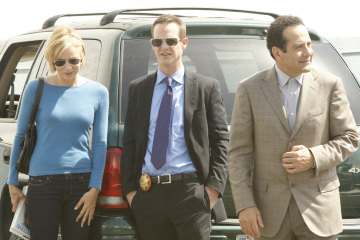 Whatís the lasting impression you want audience
members to take from watching your show and watching you?
Whatís the lasting impression you want audience
members to take from watching your show and watching you?
Thatís a great question. I think, if I had to
choose one thing, I would say that I would want people to take away this
idea that sometimes peopleís problems or neuroses are really the things
that are kind of a blessing in disguise. Even though thereís
sometimes thereís pain associated with these things sometimes in the
face of adversity with obstacles to overcome, people can really kind of
soar and find their higher selves. I think thatís what weíve tried
to do on the show is weíve portrayed this character as someone who turns
his liabilities into assets per his life. I donít know this for
sure, but I hope when we get to the end of season eight that weíll have
seen some real healing from Monk, and I believe in that. I believe
that there is healing and that there is change, and that all of those
things are Ė they are just really, really key to all of our lives.
I wondered if you had any input into the new
changes of
Monk because from the ads, it seems that heís sort of looser
and more comedic, and you mentioned that you really wanted to do a
Galaxy Quest II. Do you have a preference to comedy or drama or even
horror, because I know youíve done Thir13en Ghosts, and you had a
big part in 1408 and such?
Well, I donít really have a preference, to be
honest. In fact, my only preference is to have a lot of variety and
diversity in the material that I work on. Iíve been so fortunate
throughout my career, when I was doing more theater than anything else,
and when I was doing films that I got a chance just to do a broad range
of things. In fact, a lot of my choices were about that very thing.
Every project that I had an opportunity to do or chose to do, I wanted
it to be different from the last thing I did. I think thatís why I have
a good, diverse kind of rťsumť. Itís what I set out to do as an actor
originally.
You talked about the character and what he
means, but in terms of the pantheon of great television series, what
sort of legacy do you think this show leaves, and what do you take away
from it in that regard?
Well, I think one of the things that I hope will be
remembered, is that at a time when a lot of television Ė especially with
the onslaught of cable and in a period where television is kind of
redefining itself Ė that there were precious few shows on the air that
were suitable for a wider audience. Like a younger audience, people in
their 30ís and then like elderly people in the 70ís and 80ís. That
there was a show that all those different demographics could tune into
and appreciate, and would appreciate on their own level. There arenít a
lot of shows like that. There havenít been a lot of shows like that in
the last decade. I hope thatís something that people will focus on and
remember for a long time. Itís still possible to do interesting stories
and good comedy without having it have to be all exclusively adult
themed kinds of things or super violent or with language that some
people might feel is inappropriate for younger audiences. This show was
able to stand out and do that.
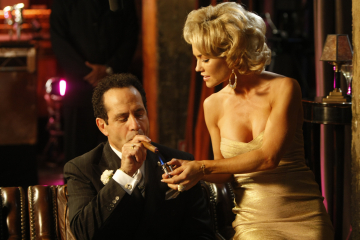 One time when I interviewed you, you mentioned
that youíre the only one at your home who knows how to absolutely Ė the
only right way to load the dishwasher, which struck me as a kind of Monk
thing to say.
One time when I interviewed you, you mentioned
that youíre the only one at your home who knows how to absolutely Ė the
only right way to load the dishwasher, which struck me as a kind of Monk
thing to say.
Iím not the only one in my home. Iím the only one
in my community, I think, my entire neighborhood, Iím pretty sure.
Who knows how to load the dishwasher right? My
question is, have you found that the longer you play Monk, that the
differences between you, Tony, and the character has eroded, which is to
say, have you become more like him, and he more like you, over the
years?
I would say yes, absolutely. I mean, I resisted it
for a long time. I wrestled with it. I fought with it. I was in
denial about it and all of that. But inevitably, you know, there have
been some Ė I feel like Iíve been infected in some way by this
character. Tendencies, you know, minor tendencies that Iíve had in my
life prior to Monk have just kind of ballooned and expanded and
itís inevitably. I mean, I just, thereís no point in trying to Ė Iíve
given up trying to resist it. Iíve had to just surrender to it. I
mean, Iím hoping that when Monk is over that Iíll have some
period of recovery, but Iím not holding my breath.
How is the final season structured? I mean, the
season premiere seemed like a very standard, great, hilarious episode,
but when do we kind of get into the wrapping of things up?
Excellent question. What the writers have in mind
is to do, as you said, our normal standalone episodes for the first, I
would say, eleven, because weíre doing sixteen, as usual. So the first
eleven, I would say, are going to be standalone, and then the last five
is when weíll be kind of connected. Theyíll have a connected tissue,
and weíll start to get into the wrap up, not just of Monk, but of
some of the other characters as well. Then what they want to do is the
final two episodes, number fifteen and sixteen, itíll just be one story,
a two-part, you know, aired in two segments. Just to follow Ė that
two-part will involve the wrap up of Trudyís murder, you know, the
solving of Trudyís murder.
What was the deciding factor to make this season
the final season?
Well, I think there were a lot of things at play
there. I mean, long conversations that I had with Andy Breckman, one of
the co-creators and the main writer. Weíve been talking all along about
how many seasons to do, how many episodes that he had in him as the
writer. He, at one point, said that he didnít think really he had more
than six seasons, and then he kind of got a gigantic second wind, and we
did the seventh. We werenít sure when we were doing the seventh if the
network was going to go with us on the eighth. But to make a long story
short, we all kind of agreed that the eighth season would be it for all
of us. I think it will have 124 episodes by the end of the eighth
season, and I think weíre all ready to resolve the storyline and move on
to other things. We certainly donít want to go too long and have the
quality start to wane and just limp to the finish line. We want to go
out while weíre still really, we feel really that weíre doing great work
and delivering really strong episodes. We want to go out on a high.
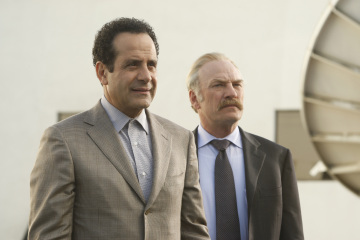 How many of the old faces for past episodes are
we going to see as a way of saying good-bye this last season?
How many of the old faces for past episodes are
we going to see as a way of saying good-bye this last season?
Well, Iím sure youíve probably read because thereís
been a lot of publicity about Sharona coming back. Bitty Schram is
going to come back for episode Ė I believe itís episode number 12, which
will start shooting in September. They want to bring that character
back and kind of wrap it up and kind of give that a good send off. A
lot of people really missed that character and the dynamic between Monk
and Sharona. Weíre all looking forward to that. Of course, weíll see
Harold Krenshaw comes back, one of my favorites. Heís the other OCD
patient who is always kind of in competition with Monk, played so
brilliantly by Tim Bagley. Heís going to return for at least a couple
of episodes. And well, thatís it. I mean, of course, Dr. Bell, the
psychiatrist will be in a number of episodes. People have asked if
weíre going to see Ambrose. I donít really think that's in the cards
simply because thatís Ö John (Turturro) is so busy. Itís difficult to
schedule him in. I mean, if I had my way, weíd do kind of what
Seinfeld did and bring back almost every guest star there ever was
on the show, but ours is going to go in a different direction.
I have to tell you. Iím from Wisconsin. Youíre
one of my motherís favorite actors.
Iím in Wisconsin as we speak. Iím at a family
reunion in Door County, so itís beautiful here.
Oh, itís fantastic there, and thatís actually my
question is, being from Wisconsin, how did you make your way from
Wisconsin to Hollywood, and do your Midwestern roots impact your acting
at all and how?
Boy, I think so. I think they do. I went to
college on the East Coast in Portland, Maine. I went to graduate school
at Yale Drama School. I worked in the theater in Cambridge,
Massachusetts for years, and moved to New York, and then to Los
Angeles. I mean, thatís kind of the Ė that was kind of the roadmap of
it. But I also come back to Wisconsin every year. I have family here,
of course, and I just think this place was a fantastic place to grow up
and kind of keeps me grounded and keeps me somewhat humble just to
return to it. Yes, I think it just keeps me balanced. I still have
great, great friends and feel like itís home.
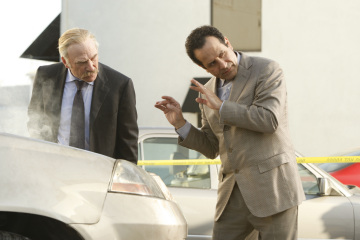 Just to reflect on some of the earlier questions
somewhat, but itís a little more specific. Have you, Tony, learned
anything from your years with the character of Adrian Monk, and do you
think Adrian has learned anything from Tony?
Just to reflect on some of the earlier questions
somewhat, but itís a little more specific. Have you, Tony, learned
anything from your years with the character of Adrian Monk, and do you
think Adrian has learned anything from Tony?
Well, I think yes. I think I have learned
something from Adrian. I think Iíve learned sometimes, hyper-focusing
on things is actually a good thing to do. Not all the time, and I
wouldnít want to get as fixated and as obsessed as Adrian, but sometimes
Iíve found that itís really helpful to look at things in my own life
with the same kind of sort of relentlessness that Monk does, just
turning something over and over and over and trying to see it from all
angles, and not being too quick to judge something or label something.
So in that sense, I feel like Iíve gained a little real life wisdom.
What has Monk gotten from me? Boy, I donít know. Thatís a really good
question. I feel like because I was playing the role, maybe Monk has
become a little more open to others and embraces to the level, to the
degree that he can, embraces other peopleís point of view. I feel like
Iíve been that kind of a person in my life, open-minded.
Some of my questions were kind of asked by a few
other people, so I guess I have two quick, short things. How involved
were you with the development of the character of Monk, and are there
any clues that point to the potential killer for Trudy besides the
garage?
Well, I wasnít really there when the character was
created. The script was around for a number of years before it came to
me, although I do feel that Iíve had some significant input. When I
came to the project, the script and the character was somewhat
different. I had long conversations with Andy Breckman about kind of
morphing the character more towards to what I wanted to do, more to my
strengths. The original script that I read was a little more slap
sticky, and I wanted to emphasize the kind of darker aspects of this
character and moreÖ and so that was a conversation that a lot of the
producers had in the beginning. I think Andy did such a great job
morphing what he had originally written to fit me and what I wanted to
do. As far as the other clues, well, I donít want to give away too much
before these episodes air because I think itís going to be a lot more
interesting for people to discover things as we go along.
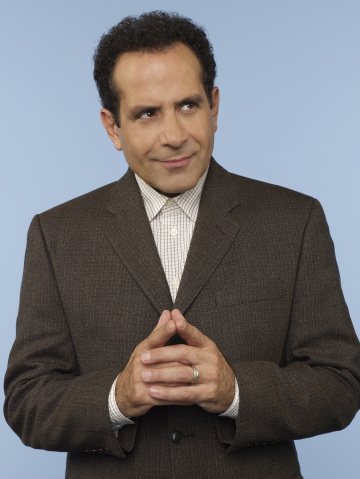 Youíve already talked about how, through the
years, youíve become more similar to Monk, and I was just wondering if,
in your own life, you found some of his compulsions entering your life
in small ways and, if so, kind of what they were.
Youíve already talked about how, through the
years, youíve become more similar to Monk, and I was just wondering if,
in your own life, you found some of his compulsions entering your life
in small ways and, if so, kind of what they were.
Well, you know, they take so many different forms
and kind of crop up at the oddest times really. There are moments when
I feel like Iím just nothing like the character. But then something
will happen, and Iíll just realize that Iím rearranging something on a
table at a restaurant. In that particular moment, [it] seems like itís
absolutely essential that the sugar packets are facing one way and that
everything else has to stop until this particular task is completed.
Then I realize, what the hell am I doing? Iím channeling the character
again. It would take me about an hour and a half to describe all of the
things that occur, but just trust me. It just kind of comes over me in
waves, and I have to really, really check myself and try and pull myself
out of these things.
Listen, the question I have for you is that of
course a big loss for your show throughout these years was the loss of
Stanley Kamel as Dr. Kroger.
Yes.
We know how Monk is dealing with the loss of the
character, but can you tell us a little bit about Tony dealing with the
loss of Stanley?
You know, itís been really tricky. Itís almost as
if he has never left us because his name comes up in stories, and
anecdotes come up about him all the time on the set. Heís missed, but
we try to sort of keep him alive in our midst. He was there from the
very, very beginning, from the pilot episode, and I have to say, those
scenes, those Dr. Kroger scenes in the pilot were so important, just in
terms of my process, my discovery of who Monk was. I think those scenes
in particular were the most informative for me and the richest. They
really, really helped me to kind of define the parameters of this guy,
of my character. So, yes, I kind of carry that with me and have for all
these seasons. Now, when Iím in these sessions with Hector Elizondo,
who plays Dr. Bell, I canít even go into these scenes without just this
little Ė I sort of do this little internal toast, as it were, to Stanley
Kamel because he was the original doctor. I like to think that heís
kind of there in those sessions with me. He is missed.
Over the years, you guys, as youíve discussed,
have had a lot of guest stars on the show. I was wondering if you had a
favorite over the years and maybe a favorite youíve worked with so far
this year.
Itís so hard for me to pick a favorite because
there have been so many great ones. Iíve had the chance to bring
friends of mine on the show, I mean, people that Iíve worked with in the
past like Stanley Tucci and John Turturro. People that Iíve always
wanted to work with like Laurie Metcalf. But I have to say, of all of
the seasons, and of all of the guest stars, the most thrilling for me
was last season working with Gena Rowlands on ďMr. Monk and the Lady
Next Door.Ē She was such a tremendous influence on me when I was a
student and studying acting. I was a devotee of John Cassavetes movies
and the movies she did even separate from him. I was the one who
actually when we were casting that particular episode, ďThe Lady Next
Door,Ē there were a number of names on the list, and I pitched her
name. I was stunned and thrilled to find out that she wanted to do it.
Then working those eight days with her was justÖ you know, I felt
really, when we finished that episode, I felt like I could retire, that
I had done everything I needed to do now. She was so gracious and so
good, and of course sheís been nominated for an Emmy for that episode
too, so I will hopefully see her at the Emmys in September.
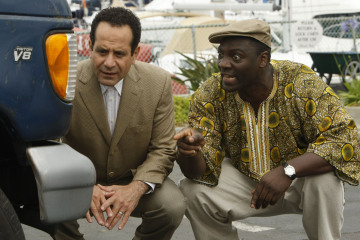 I think the character of Monk has been portrayed
very respectful about his disorder. What was the process you went into
in the research to try to make sure you didnít go over the top and play
it maybe possibly offensive?
I think the character of Monk has been portrayed
very respectful about his disorder. What was the process you went into
in the research to try to make sure you didnít go over the top and play
it maybe possibly offensive?
The process was really one of - itís a process that
I use and have used in approaching other characters, which is knowing
that itís a comedy and to find out what Ė in any comedy, what I try to
do is I try and find out what are the more serious aspects of the
character. Conversely, when I do a serious role, I try and find out
whatís funny about the character. The beauty of this particular
character is that Iíve had the opportunity to do both comedy and drama
within one series, one character. So I guess to answer your
question, itís really when youíre doing the comedic moments, digging out
whatís really, really at stake and what is the most important and most
serious thing to the character, which I believe informs the comedy. And
then conversely, you know, when the moments are really dark and
poignant, trying to infuse those with an unexpected and sometimes
inappropriate or seemingly inappropriate comedic flash, you know, a
little spark of something absurd or comedic. Thatís been my approach.
I know you talked about your favorite guest
stars, but I was wondering if you had a particular favorite episode of
Monk.
Man. This is so difficult because I have so many
that are just so near and dear to me. I kind of will reframe the
question in the answer, I think. I will say the ones where I think
weíve done the best, in other words, those episodes where we did 100% of
what we set out to do or 100% of how we imagined the show should be in a
perfect world when weíre doing our job Ė just the best. Those episodes
would be, I would say, the first John Turturro episode where we meet the
character of Ambrose. That was called ďMr. Monk and the Three
Pies.Ē Another favorite of mine was ďMr. Monk Takes His MedicineĒ
because it was a chance for me to do this character almost as a
different character. See a different part of him emerge. We did
an episode that we just shot in the first part of season eight, which
will be airing in about a month. Itís called ďMr. Monk is Someone
Else,Ē and itís an episode whereÖ assume this character of a man who
looks just like him, but the character happens to be a professional hit
man for the mafia. This character dies, and Monk is asked to take this
guy on and become him. Those opportunities to kind of transform
within the character are really, really challenging and satisfying.
Trudyís murder has been one of the most
successful narrative arcs in television history, rivaling even Mulderís
sister Samantha on the X-Files.
Wow.
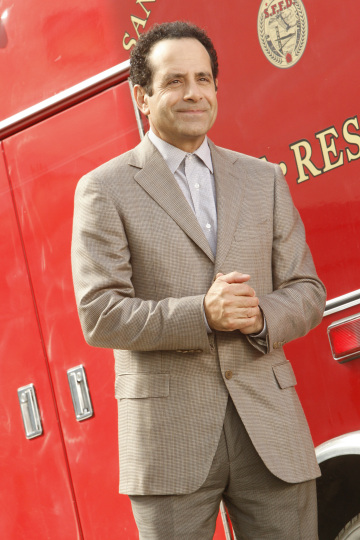 So what do you think Ė while itís going to be
addressed in the final season, do you think it should be solved or left
for the audience as more of a McGuffin?
So what do you think Ė while itís going to be
addressed in the final season, do you think it should be solved or left
for the audience as more of a McGuffin?
I really think it should be solved. I know there
are people who say that maybe it shouldnít because that would mean that
there would be life for this character beyond the series and that
possibly the solving of Trudyís murder would cure him in some way or
take down his OCD symptoms, and then the character wouldnít really be
the character that weíve come to recognize. But I really feel that
weíve worked this storyline so delicately and for so long that I think
we owe it to not just the audience and to ourselves, but to the
character of Monk and to the character of Trudy that weíve created. I
think we should solve it.
Whatís the most memorable moment youíve had
filming the series?
The most memorable moment? I canít remember my
most memorable. I think I would have to say the most memorable moment
would be when I was doing the episode with Stanley Tucci, ďMr. Monk and
the Actor,Ē and having been reunited from having worked together for a
number of times. In the climax of the episode where I take the gun away
from him, and weíre kind of sitting on the floor leaning up against this
counter thing, you know, kind of our arms over each otherís shoulders
because it was reminiscent of a moment in Big Night, which was
such a gigantic turning point for me, I think, in terms of film of my
career. So in that moment in Monk kind of reminded me of
the moment in the movie was pretty emotional, a pretty emotional time.
Now just because USA is bringing the series to
an end because of their choice and collectively yours, as weíve heard,
it doesnít mean another network down the line, a couple of years or so,
wouldnít pick it up, following, of course, on from the reveal of who the
killer was. Now is this a choice that youíve thought about that maybe
you would contemplate a return to the character down the line in a
couple, three years perhaps?
You know, Iíve given that a lot of thought. I feel
like Iím ready to put this character to rest, but by the same token, I
never say never. Circumstances could change, and I could change my
mind. Certainly Iíve been known to change my mind. I just think time
will tell. I would never ever rule something like that out. I hope
that answers your question.
Do you ever foresee maybe doing specials in the
future? And also, what are you going to miss the most about playing
this character that youíve played for so long?
Well, to answer your first question, I assume
youíre talking about like a TV movie or something of the character the
way Columbo did. I donít really see that being so likely just
because Iím hoping that Iím going to be busy with other things. Maybe
Iím diluting myself.
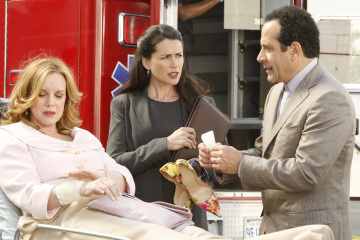 I just watched the season premiere, and this
question is sort of specific to that episode (ďMr. Monkís Favorite
Show,Ē in which he must protect the star of an old TV series that he
idolizes). Have you ever run across any people who are as passionate
about Adrian Monk as Adrian was about Christine Rapp
I just watched the season premiere, and this
question is sort of specific to that episode (ďMr. Monkís Favorite
Show,Ē in which he must protect the star of an old TV series that he
idolizes). Have you ever run across any people who are as passionate
about Adrian Monk as Adrian was about Christine Rapp